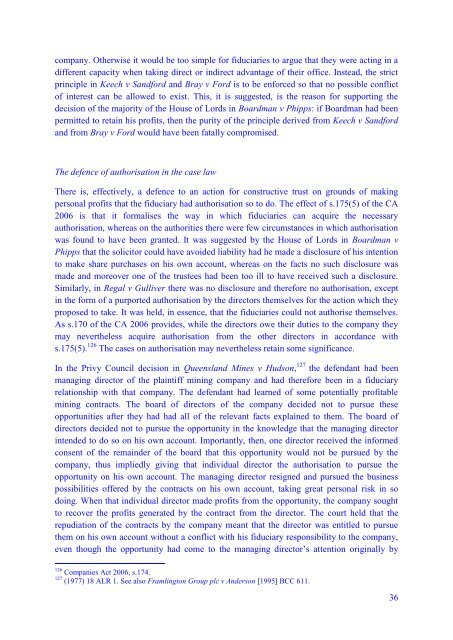Chapter 7 Directors' Duties - alastairhudson.com
Chapter 7 Directors' Duties - alastairhudson.com
Chapter 7 Directors' Duties - alastairhudson.com
You also want an ePaper? Increase the reach of your titles
YUMPU automatically turns print PDFs into web optimized ePapers that Google loves.
<strong>com</strong>pany. Otherwise it would be too simple for fiduciaries to argue that they were acting in a<br />
different capacity when taking direct or indirect advantage of their office. Instead, the strict<br />
principle in Keech v Sandford and Bray v Ford is to be enforced so that no possible conflict<br />
of interest can be allowed to exist. This, it is suggested, is the reason for supporting the<br />
decision of the majority of the House of Lords in Boardman v Phipps: if Boardman had been<br />
permitted to retain his profits, then the purity of the principle derived from Keech v Sandford<br />
and from Bray v Ford would have been fatally <strong>com</strong>promised.<br />
The defence of authorisation in the case law<br />
There is, effectively, a defence to an action for constructive trust on grounds of making<br />
personal profits that the fiduciary had authorisation so to do. The effect of s.175(5) of the CA<br />
2006 is that it formalises the way in which fiduciaries can acquire the necessary<br />
authorisation, whereas on the authorities there were few circumstances in which authorisation<br />
was found to have been granted. It was suggested by the House of Lords in Boardman v<br />
Phipps that the solicitor could have avoided liability had he made a disclosure of his intention<br />
to make share purchases on his own account, whereas on the facts no such disclosure was<br />
made and moreover one of the trustees had been too ill to have received such a disclosure.<br />
Similarly, in Regal v Gulliver there was no disclosure and therefore no authorisation, except<br />
in the form of a purported authorisation by the directors themselves for the action which they<br />
proposed to take. It was held, in essence, that the fiduciaries could not authorise themselves.<br />
As s.170 of the CA 2006 provides, while the directors owe their duties to the <strong>com</strong>pany they<br />
may nevertheless acquire authorisation from the other directors in accordance with<br />
s.175(5). 126 The cases on authorisation may nevertheless retain some significance.<br />
In the Privy Council decision in Queensland Mines v Hudson, 127<br />
the defendant had been<br />
managing director of the plaintiff mining <strong>com</strong>pany and had therefore been in a fiduciary<br />
relationship with that <strong>com</strong>pany. The defendant had learned of some potentially profitable<br />
mining contracts. The board of directors of the <strong>com</strong>pany decided not to pursue these<br />
opportunities after they had had all of the relevant facts explained to them. The board of<br />
directors decided not to pursue the opportunity in the knowledge that the managing director<br />
intended to do so on his own account. Importantly, then, one director received the informed<br />
consent of the remainder of the board that this opportunity would not be pursued by the<br />
<strong>com</strong>pany, thus impliedly giving that individual director the authorisation to pursue the<br />
opportunity on his own account. The managing director resigned and pursued the business<br />
possibilities offered by the contracts on his own account, taking great personal risk in so<br />
doing. When that individual director made profits from the opportunity, the <strong>com</strong>pany sought<br />
to recover the profits generated by the contract from the director. The court held that the<br />
repudiation of the contracts by the <strong>com</strong>pany meant that the director was entitled to pursue<br />
them on his own account without a conflict with his fiduciary responsibility to the <strong>com</strong>pany,<br />
even though the opportunity had <strong>com</strong>e to the managing director‟s attention originally by<br />
126 Companies Act 2006, s.174.<br />
127 (1977) 18 ALR 1. See also Framlington Group plc v Anderson [1995] BCC 611.<br />
36













